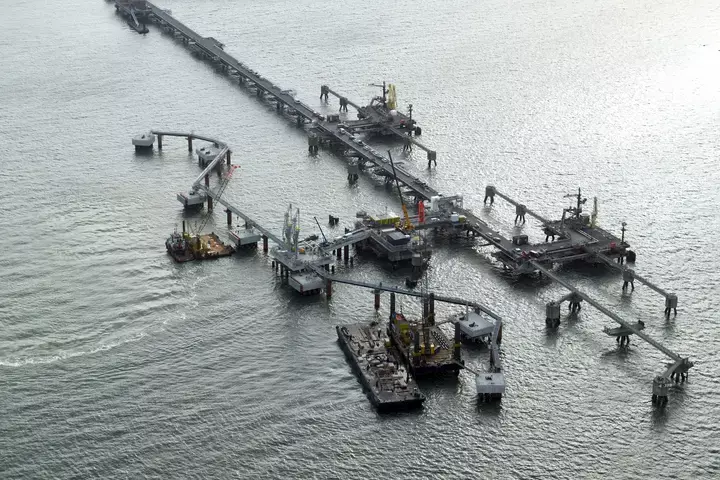Germany’s Costly LNG Terminals: A Maritime Industry Perspective
In a bid to ensure energy security, Germany invested heavily in liquefied natural gas (LNG) terminals. However, the high operating costs of these terminals have resulted in a meager 8% of the country’s total gas imports coming via its shipping terminals in 2023. This underutilization has significant implications for the maritime industry, which is the focus of this article.
The High Cost of Germany’s LNG Terminals
Germany’s LNG terminals, including those in Wilhelmshaven, Brunsbüttel, Lubmin, and Mukran, were expected to play a crucial role in reducing the country’s dependence on Russian gas. However, the high variable regasification costs, which are 86% higher than those in other northwest European facilities, have made them less competitive. According to Qasim Afghan, a commercial analyst at Spark Commodities Pte Ltd, several factors contribute to these high costs:
- Higher operating costs of floating import terminals, particularly during winter months
- Increased fuel gas losses due to power consumption required for the regasification process
Underutilization and Its Impact
As a result of these high costs, Germany has the most regasification prompt slots available for purchase in Europe, indicating unused capacity that is likely not economically viable. The Höegh Esperanza floating LNG import ship at Germany’s Wilhelmshaven LNG terminal is a prime example of this underutilization.
The underutilization of Germany’s LNG terminals has significant implications for the maritime industry. With reduced demand for LNG imports, shipping companies may need to adjust their routes and schedules, potentially leading to:
- Reduced cargo volumes and revenue
- Increased competition for available cargo
- Potential layoffs or reduced working hours for seafarers
Investment and Growth Implications
Furthermore, the high operating costs of Germany’s LNG terminals may deter investors and operators from investing in new projects. This could hinder the growth of the maritime industry as a whole. The environmental impact is also notable, with reduced demand for LNG imports potentially leading to a decrease in greenhouse gas emissions from shipping activities. However, this benefit may be offset by the increased use of other fossil fuels to meet Germany’s energy demands.
Technical Parameters and Additional Data
To understand the context better, here are some key data points:
- Total gas imports via German LNG terminals in 2023: 8%
- Variable regasification costs in Germany: 86% higher than other northwest European facilities
- Fuel gas losses in Germany: higher than elsewhere in Europe
- Regasification prompt slots available for purchase in Europe: Germany has the most
- LNG imports into the EU in 2021: 80 billion cubic meters (13 EU countries)
- Share of LNG imports in total extra-EU gas imports in 2021: 20%
- Domestic gas production in the EU: around 10% of total gas needs (decreasing over time)
Summary
Germany’s costly LNG terminals have failed to deliver on their promise of ensuring energy security. With high operating costs and reduced demand for LNG imports, the maritime industry is likely to feel the effects. This includes reduced cargo volumes, increased competition, and potential layoffs. Additionally, the high costs may deter future investments, impacting the industry’s growth.
Conclusion
As the global energy landscape continues to evolve, it is essential for investors, operators, and policymakers to reassess their strategies. Prioritizing sustainable and economically viable solutions will be crucial. This includes exploring alternative energy sources, improving operational efficiency, and fostering a supportive regulatory environment. By taking proactive measures, the maritime industry can navigate these challenges and secure a more resilient future.
For further insights and updates, stay tuned to our blog. We provide in-depth analyses and industry trends to help you stay informed and make better business decisions.
List of Sources
- Germany’s Costly LNG Terminals Aren’t Paying Off as Imports Dip
- Germany’s Costly LNG Terminals Aren’t Paying Off as Imports Dip
- Is Germany still importing Russian gas? – DW – 11/19/2024
- Germany Warns Import Terminals to Refuse Deliveries of Russian LNG
- EU Approves “Exceptional” $4B Subsidy for German LNG Import Terminals
- Germany To Shut Down Key LNG Terminal In 2025 | OilPrice.com
- At all costs. Germany shifts to LNG – OSW Centre for Eastern Studies
- Ukraine war pushes Germany to build LNG terminals
- Germany finishes construction of its first LNG import terminal
- Germany builds up LNG import terminals | Reuters


Leave a Reply